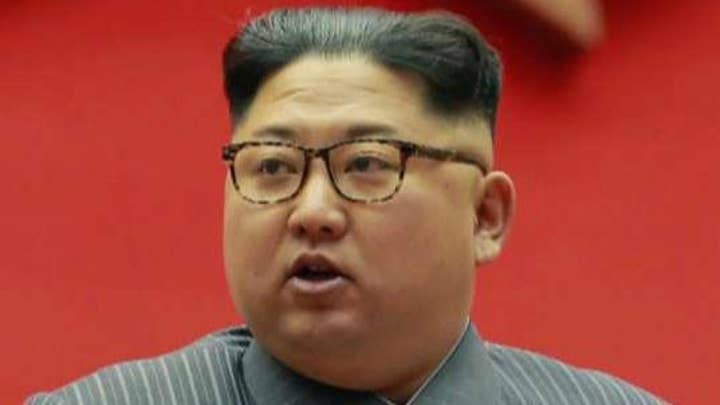Fox News Flash top headlines for Jan. 1
Fox News Flash top headlines for Jan. 1 are here. Check out what's clicking on Foxnews.com
With a threat to test a “new strategic weapon” in “the near future” North Korea has, in effect, put an ICBM to President Donald Trump’s head in order to gain the two concessions it wants most: sanctions relief and some sort of security guarantee.
North Korean leader Kim Jong Un is now playing a dangerous game of geopolitical chicken, telegraphing to the world that he most likely will test a new long-range missile that could kill millions of Americans if it landed in a heavily populated area – but would be guaranteed to provoke a devastating U.S retaliatory attack on the North.
Trump needs to play his cards right now and base his strategy on an understanding of why North Korea continues to build and test missiles and why it refuses to abandon its nuclear weapons.
KIM JONG UN SAYS NORTH KOREA NEEDS TO TAKE 'OFFENSIVE MEASURES' TO PROTECT COUNTRY'S SECURITY
If he succeeds, the president can minimize any potential nuclear challenge coming for the communist regime and even bring Kim back to the negotiating table.
Of course, any good strategy to take on the North Korean threat must be based on facts on the ground and must be rooted in historical perspective and an understanding of what the hermit kingdom is trying to achieve and what motivates Kim’s actions.
Let’s get one thing straight. Kim is not crazy nor is he suicidal. His goal is not to start a nuclear war that will spark a massive U.S. retaliation that would destroy his country and could result in his own death. His goal is to get relief from U.S. and international economic sanctions without giving up his nukes.
All it would take is the nuclear weapons aboard just one U.S. Navy ballistic submarine – carrying an astounding 192 nuclear warheads – to wipe out North Korea in roughly 20 minutes. Its population of 25 million people would be killed – all from just one submarine lurking below the surface in the Pacific Ocean – and Kim knows that. That’s some real “fire and fury.”
The North Korean dictator – who follows his grandfather and father in leading his nation like a communist hereditary monarch – has a clearly established goal we can all relate to: survival.
Let’s get one thing straight. Kim is not crazy nor is he suicidal. His goal is not to start a nuclear war that will spark a massive U.S. retaliation that would destroy his country and could result in his own death. His goal is to get relief from U.S. and international economic sanctions without giving up his nukes.
Kim believes that his nuclear weapons are the ultimate insurance policy against an attack by the U.S., South Korea or any other nation aiming to overthrow his regime.
Kim knows that U.S. and United Nations forces attacked his country in the Korean War, and is well aware that American forces have waged long wars in Vietnam, Afghanistan and Iraq in the years since. He doesn’t want any foreign forces seeking regime change in a second Korean War with either a conventional or a nuclear attack – and knows his nukes can act as a deterrent to prevent that.
North Korea has made huge sacrifices to build up its small but very dangerous arsenal of nuclear weapons and missiles. Although the nation has an economy smaller than the state of Montana and can barely feed its own people, it has beaten the odds to join the nuclear club.
But because the North has spent huge sums of money and endured years of international economic sanctions to go nuclear, it’s not realistic to expect to Kim to simply hand over all his nuclear bombs and missiles to the U.S. anytime soon.
Demanding such a full denuclearization in return for eventual sanctions relief – something that would take years – is not a policy at all, but a recipe for disaster, simply ensuring that Kim builds more and bigger nuclear weapons.
A senior White House adviser told me that he considers North Korea “a fourth-world nation that could kill 100 million people in an hour – and that’s just with nukes, never mind all those chemical and biological weapons. North Korea is a Pandora’s box that – if you open it with military force – will spark at the very least a mini Armageddon.”
From all of this, a very clear strategy can emerge for the Trump administration if it can take a more long-term approach. The administration needs to understand that for at least the short to medium term, North Korea will be unwilling to give up its nuclear arms – the regime said as much just weeks ago.
For now, Team Trump must focus on starving the regime of any resources it can get its hands on to advance its nuclear program through the tightest sanctions possible and depriving the Kim family of any technology that could advance such a cause.
And that’s just the beginning. Washington must also ensure that Pyongyang does not sell any of its nuclear or missile technology. There is clear evidence that North Korea and Iran have traded such knowledge over the years.
America must do all it can to ensure that such transfers stop and that no other nation gains from North Korea’s nuclear advances – and prevent Pyongyang from making money off them to advance its weapons of mass destruction programs.
Such a policy of what amounts to a Cold War-style containment must be matched by a willingness to continue dialogue. The history of U.S.-North Korea relations is filled with too many ups and downs – tensions and breakthroughs that are too dangerous to continue.
We must be willing to try and remove the reasons that North Korea feels it needs nuclear weapons. That can only be done by building trust. As a start, a formal peace declaration ending the Korean War should be signed. In addition, liaison offices should be set up in each nation’s capital to ensure a crisis does not end up in a shooting war.
CLICK HERE TO SIGN UP FOR OUR OPINION NEWSLETTER
From there, both sides should work on small steps to remove all military threats facing the other – both nuclear and conventional. In fact, we should make the nuclear disarmament of North Korea the end goal of a long-term policy shift that could take years but lead to a more stable, less up-and-down relationship.
None of this will be easy. In fact, it would be much easier to do what every other U.S. administration has done on North Korea: confront the regime when it acts aggressively, punish it with sanctions and sound tough, but then move on to the next global crisis or challenge at home when missiles stop heading skyward. That would be a mistake.
Eventually, President Trump or a future president may reluctantly come to the painful conclusion that getting North Korea to abandon its nuclear weapons is as impossible as trying to get Russia, China, India, Pakistan, or another member of the nuclear club to turn back the clock and give up its nukes.
CLICK HERE TO GET THE FOX NEWS APP
Should that day come, our fallback position should be to press for an arms control agreement to limit the North Korean nuclear force to the smallest size possible in return for normalized relations.
Past U.S. leaders weren’t happy when the Soviet Union and China went nuclear – but weren’t prepared to start a nuclear war to force their denuclearization. And in all the years since, no nation has launched a nuclear attack.










































